Business and Corporate Law: Misrepresentation and Liability in Pre and Post Incorporation Contracts
VerifiedAdded on 2023/06/08
|12
|2699
|431
AI Summary
This article discusses the rules of misrepresentation and liability in pre and post incorporation contracts under Business and Corporate Law. It covers the case of fraudulent misrepresentation, consideration, and the liability of directors and officers of a company. The article also explains the assumptions that third parties can make in such contracts.
Contribute Materials
Your contribution can guide someone’s learning journey. Share your
documents today.

ine and orporate aBus ss C L w
9 / 1 0 / 2 0 1 8
t dent ameS u ’s N
9 / 1 0 / 2 0 1 8
t dent ameS u ’s N
Secure Best Marks with AI Grader
Need help grading? Try our AI Grader for instant feedback on your assignments.
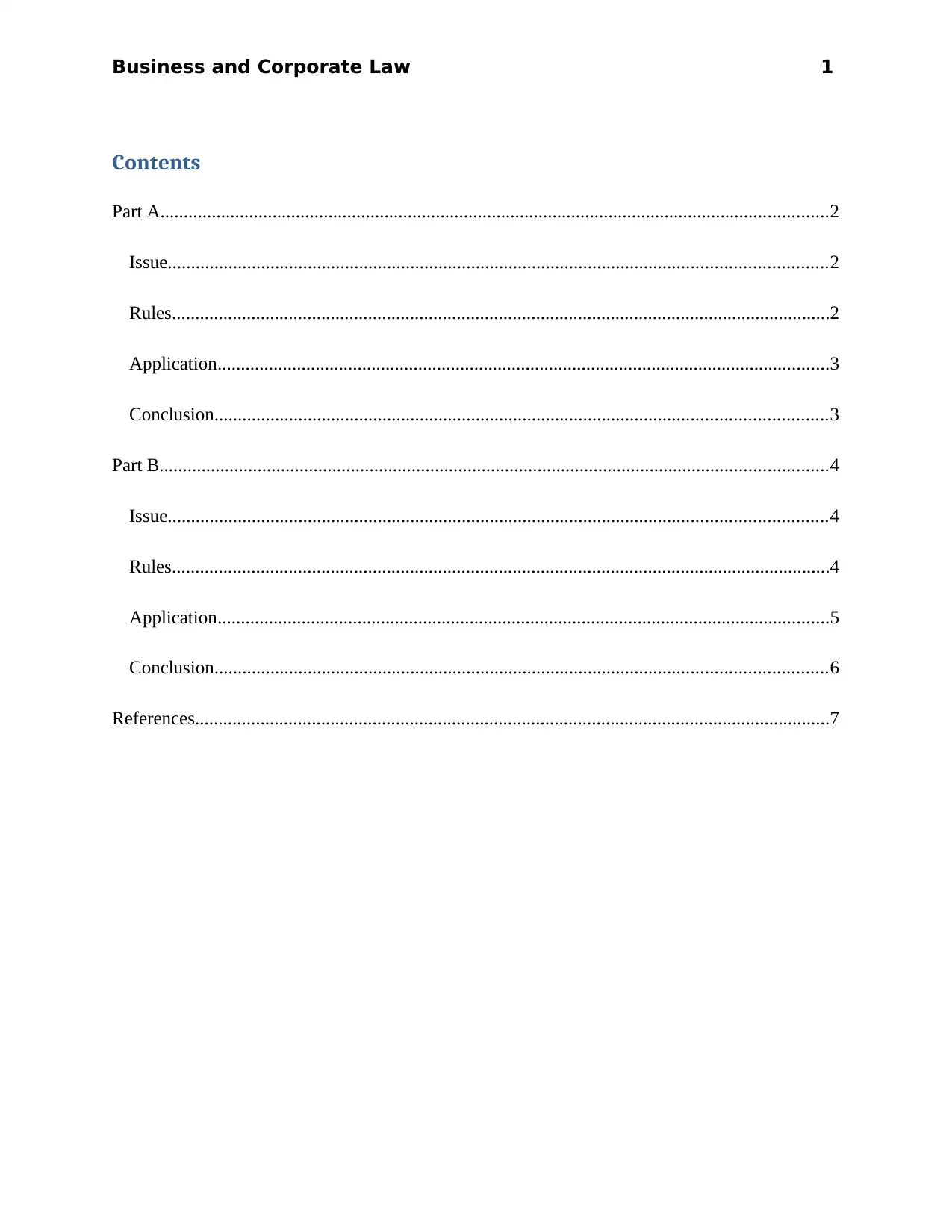
Business and Corporate Law 1
Contents
Part A...............................................................................................................................................2
Issue.............................................................................................................................................2
Rules.............................................................................................................................................2
Application...................................................................................................................................3
Conclusion...................................................................................................................................3
Part B...............................................................................................................................................4
Issue.............................................................................................................................................4
Rules.............................................................................................................................................4
Application...................................................................................................................................5
Conclusion...................................................................................................................................6
References........................................................................................................................................7
Contents
Part A...............................................................................................................................................2
Issue.............................................................................................................................................2
Rules.............................................................................................................................................2
Application...................................................................................................................................3
Conclusion...................................................................................................................................3
Part B...............................................................................................................................................4
Issue.............................................................................................................................................4
Rules.............................................................................................................................................4
Application...................................................................................................................................5
Conclusion...................................................................................................................................6
References........................................................................................................................................7
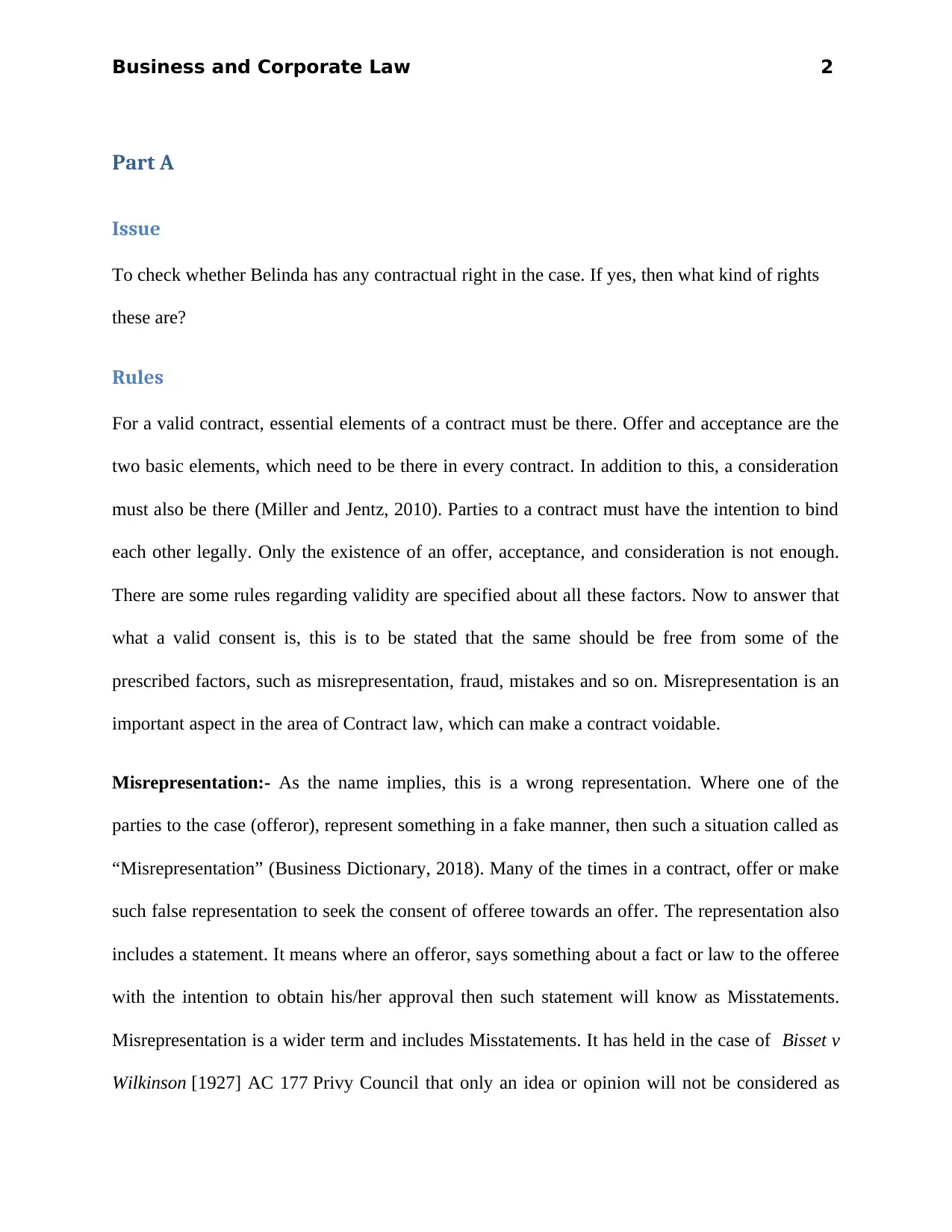
Business and Corporate Law 2
Part A
Issue
To check whether Belinda has any contractual right in the case. If yes, then what kind of rights
these are?
Rules
For a valid contract, essential elements of a contract must be there. Offer and acceptance are the
two basic elements, which need to be there in every contract. In addition to this, a consideration
must also be there (Miller and Jentz, 2010). Parties to a contract must have the intention to bind
each other legally. Only the existence of an offer, acceptance, and consideration is not enough.
There are some rules regarding validity are specified about all these factors. Now to answer that
what a valid consent is, this is to be stated that the same should be free from some of the
prescribed factors, such as misrepresentation, fraud, mistakes and so on. Misrepresentation is an
important aspect in the area of Contract law, which can make a contract voidable.
Misrepresentation:- As the name implies, this is a wrong representation. Where one of the
parties to the case (offeror), represent something in a fake manner, then such a situation called as
“Misrepresentation” (Business Dictionary, 2018). Many of the times in a contract, offer or make
such false representation to seek the consent of offeree towards an offer. The representation also
includes a statement. It means where an offeror, says something about a fact or law to the offeree
with the intention to obtain his/her approval then such statement will know as Misstatements.
Misrepresentation is a wider term and includes Misstatements. It has held in the case of Bisset v
Wilkinson [1927] AC 177 Privy Council that only an idea or opinion will not be considered as
Part A
Issue
To check whether Belinda has any contractual right in the case. If yes, then what kind of rights
these are?
Rules
For a valid contract, essential elements of a contract must be there. Offer and acceptance are the
two basic elements, which need to be there in every contract. In addition to this, a consideration
must also be there (Miller and Jentz, 2010). Parties to a contract must have the intention to bind
each other legally. Only the existence of an offer, acceptance, and consideration is not enough.
There are some rules regarding validity are specified about all these factors. Now to answer that
what a valid consent is, this is to be stated that the same should be free from some of the
prescribed factors, such as misrepresentation, fraud, mistakes and so on. Misrepresentation is an
important aspect in the area of Contract law, which can make a contract voidable.
Misrepresentation:- As the name implies, this is a wrong representation. Where one of the
parties to the case (offeror), represent something in a fake manner, then such a situation called as
“Misrepresentation” (Business Dictionary, 2018). Many of the times in a contract, offer or make
such false representation to seek the consent of offeree towards an offer. The representation also
includes a statement. It means where an offeror, says something about a fact or law to the offeree
with the intention to obtain his/her approval then such statement will know as Misstatements.
Misrepresentation is a wider term and includes Misstatements. It has held in the case of Bisset v
Wilkinson [1927] AC 177 Privy Council that only an idea or opinion will not be considered as
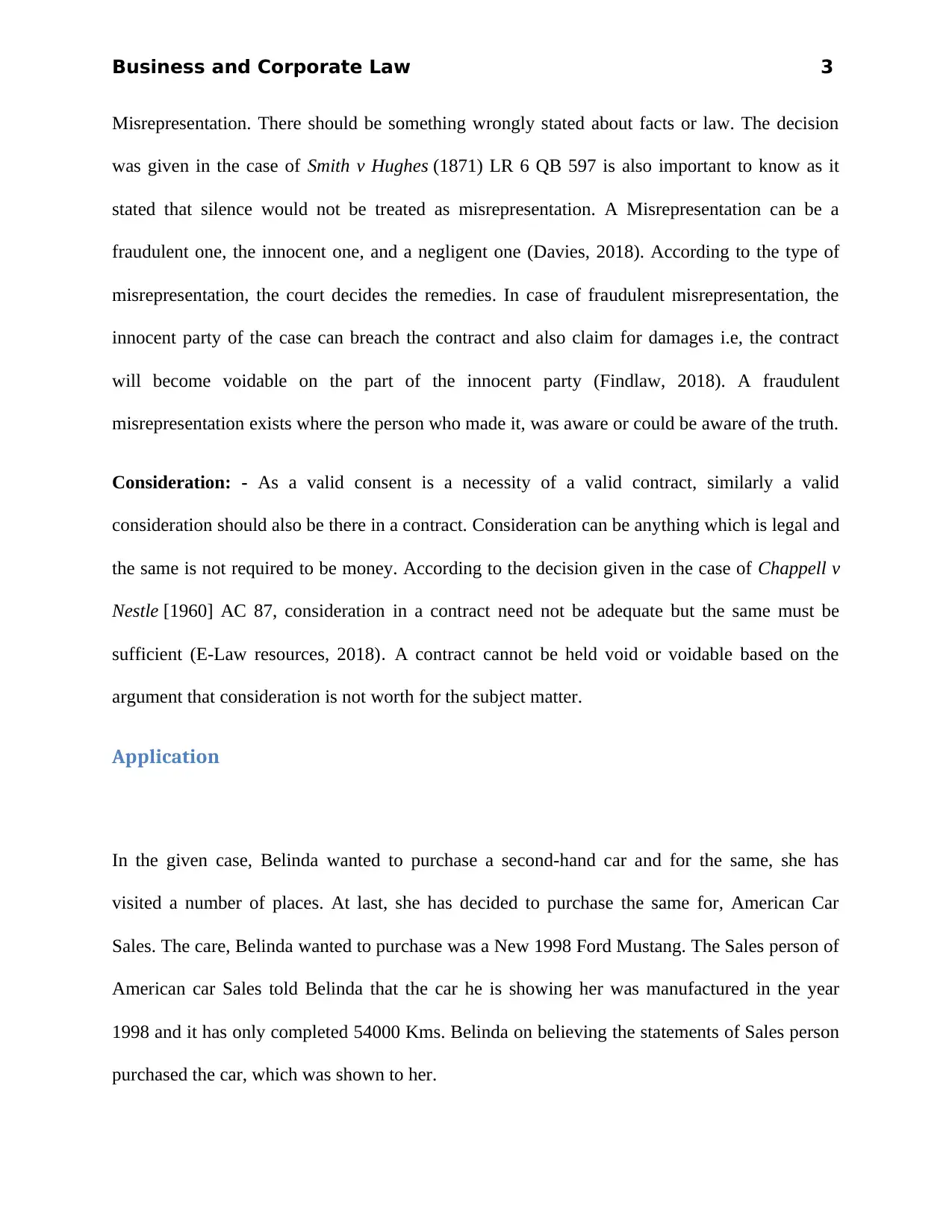
Business and Corporate Law 3
Misrepresentation. There should be something wrongly stated about facts or law. The decision
was given in the case of Smith v Hughes (1871) LR 6 QB 597 is also important to know as it
stated that silence would not be treated as misrepresentation. A Misrepresentation can be a
fraudulent one, the innocent one, and a negligent one (Davies, 2018). According to the type of
misrepresentation, the court decides the remedies. In case of fraudulent misrepresentation, the
innocent party of the case can breach the contract and also claim for damages i.e, the contract
will become voidable on the part of the innocent party (Findlaw, 2018). A fraudulent
misrepresentation exists where the person who made it, was aware or could be aware of the truth.
Consideration: - As a valid consent is a necessity of a valid contract, similarly a valid
consideration should also be there in a contract. Consideration can be anything which is legal and
the same is not required to be money. According to the decision given in the case of Chappell v
Nestle [1960] AC 87, consideration in a contract need not be adequate but the same must be
sufficient (E-Law resources, 2018). A contract cannot be held void or voidable based on the
argument that consideration is not worth for the subject matter.
Application
In the given case, Belinda wanted to purchase a second-hand car and for the same, she has
visited a number of places. At last, she has decided to purchase the same for, American Car
Sales. The care, Belinda wanted to purchase was a New 1998 Ford Mustang. The Sales person of
American car Sales told Belinda that the car he is showing her was manufactured in the year
1998 and it has only completed 54000 Kms. Belinda on believing the statements of Sales person
purchased the car, which was shown to her.
Misrepresentation. There should be something wrongly stated about facts or law. The decision
was given in the case of Smith v Hughes (1871) LR 6 QB 597 is also important to know as it
stated that silence would not be treated as misrepresentation. A Misrepresentation can be a
fraudulent one, the innocent one, and a negligent one (Davies, 2018). According to the type of
misrepresentation, the court decides the remedies. In case of fraudulent misrepresentation, the
innocent party of the case can breach the contract and also claim for damages i.e, the contract
will become voidable on the part of the innocent party (Findlaw, 2018). A fraudulent
misrepresentation exists where the person who made it, was aware or could be aware of the truth.
Consideration: - As a valid consent is a necessity of a valid contract, similarly a valid
consideration should also be there in a contract. Consideration can be anything which is legal and
the same is not required to be money. According to the decision given in the case of Chappell v
Nestle [1960] AC 87, consideration in a contract need not be adequate but the same must be
sufficient (E-Law resources, 2018). A contract cannot be held void or voidable based on the
argument that consideration is not worth for the subject matter.
Application
In the given case, Belinda wanted to purchase a second-hand car and for the same, she has
visited a number of places. At last, she has decided to purchase the same for, American Car
Sales. The care, Belinda wanted to purchase was a New 1998 Ford Mustang. The Sales person of
American car Sales told Belinda that the car he is showing her was manufactured in the year
1998 and it has only completed 54000 Kms. Belinda on believing the statements of Sales person
purchased the car, which was shown to her.
Secure Best Marks with AI Grader
Need help grading? Try our AI Grader for instant feedback on your assignments.
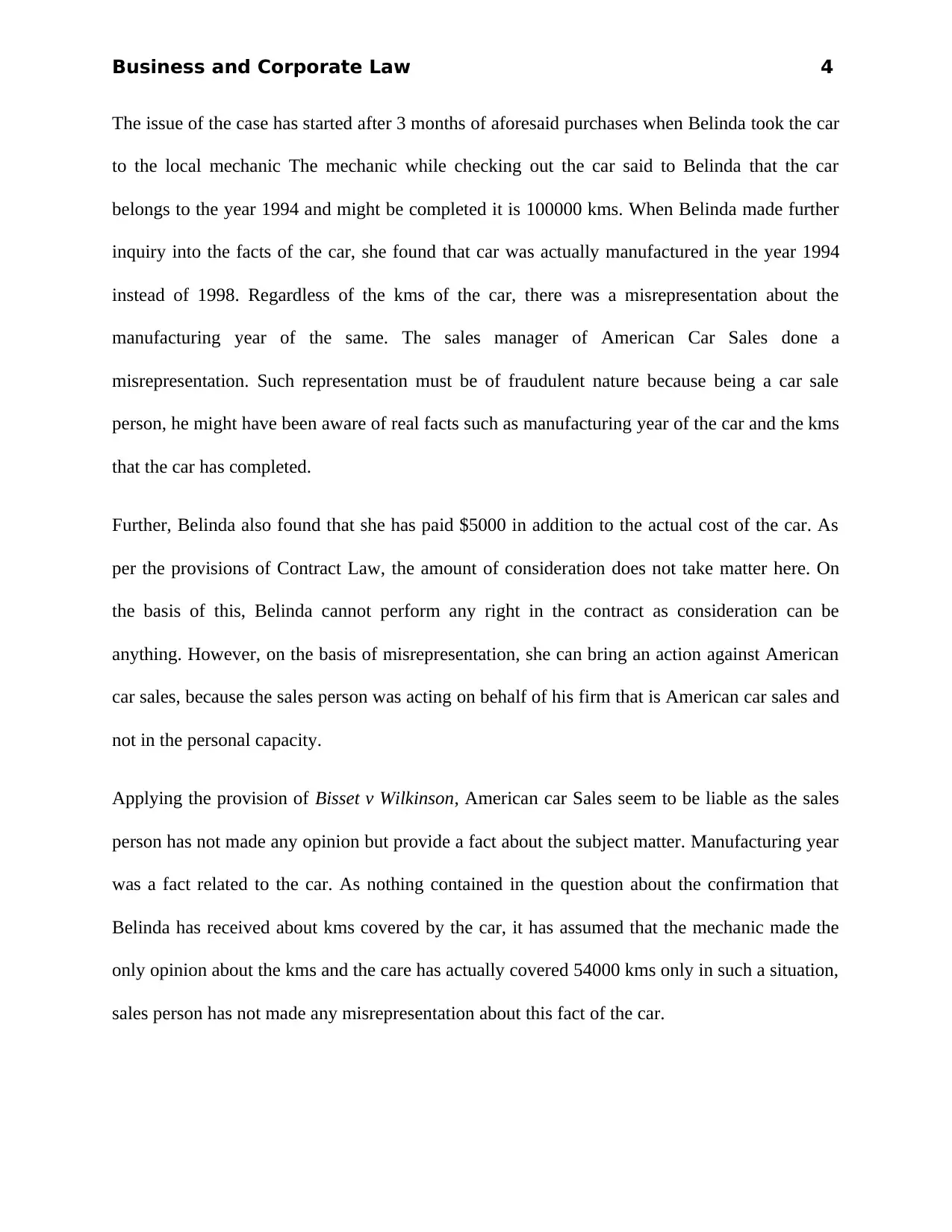
Business and Corporate Law 4
The issue of the case has started after 3 months of aforesaid purchases when Belinda took the car
to the local mechanic The mechanic while checking out the car said to Belinda that the car
belongs to the year 1994 and might be completed it is 100000 kms. When Belinda made further
inquiry into the facts of the car, she found that car was actually manufactured in the year 1994
instead of 1998. Regardless of the kms of the car, there was a misrepresentation about the
manufacturing year of the same. The sales manager of American Car Sales done a
misrepresentation. Such representation must be of fraudulent nature because being a car sale
person, he might have been aware of real facts such as manufacturing year of the car and the kms
that the car has completed.
Further, Belinda also found that she has paid $5000 in addition to the actual cost of the car. As
per the provisions of Contract Law, the amount of consideration does not take matter here. On
the basis of this, Belinda cannot perform any right in the contract as consideration can be
anything. However, on the basis of misrepresentation, she can bring an action against American
car sales, because the sales person was acting on behalf of his firm that is American car sales and
not in the personal capacity.
Applying the provision of Bisset v Wilkinson, American car Sales seem to be liable as the sales
person has not made any opinion but provide a fact about the subject matter. Manufacturing year
was a fact related to the car. As nothing contained in the question about the confirmation that
Belinda has received about kms covered by the car, it has assumed that the mechanic made the
only opinion about the kms and the care has actually covered 54000 kms only in such a situation,
sales person has not made any misrepresentation about this fact of the car.
The issue of the case has started after 3 months of aforesaid purchases when Belinda took the car
to the local mechanic The mechanic while checking out the car said to Belinda that the car
belongs to the year 1994 and might be completed it is 100000 kms. When Belinda made further
inquiry into the facts of the car, she found that car was actually manufactured in the year 1994
instead of 1998. Regardless of the kms of the car, there was a misrepresentation about the
manufacturing year of the same. The sales manager of American Car Sales done a
misrepresentation. Such representation must be of fraudulent nature because being a car sale
person, he might have been aware of real facts such as manufacturing year of the car and the kms
that the car has completed.
Further, Belinda also found that she has paid $5000 in addition to the actual cost of the car. As
per the provisions of Contract Law, the amount of consideration does not take matter here. On
the basis of this, Belinda cannot perform any right in the contract as consideration can be
anything. However, on the basis of misrepresentation, she can bring an action against American
car sales, because the sales person was acting on behalf of his firm that is American car sales and
not in the personal capacity.
Applying the provision of Bisset v Wilkinson, American car Sales seem to be liable as the sales
person has not made any opinion but provide a fact about the subject matter. Manufacturing year
was a fact related to the car. As nothing contained in the question about the confirmation that
Belinda has received about kms covered by the car, it has assumed that the mechanic made the
only opinion about the kms and the care has actually covered 54000 kms only in such a situation,
sales person has not made any misrepresentation about this fact of the car.
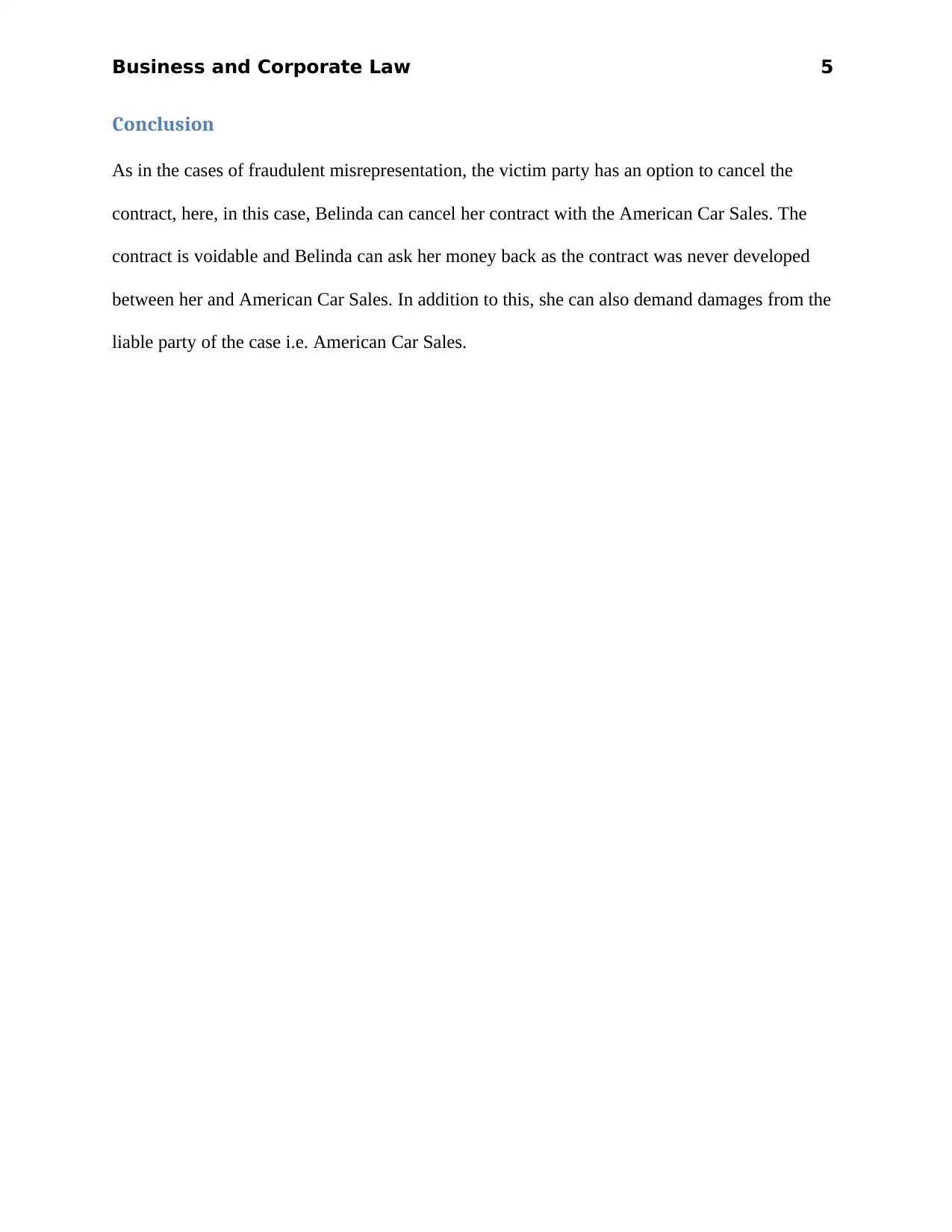
Business and Corporate Law 5
Conclusion
As in the cases of fraudulent misrepresentation, the victim party has an option to cancel the
contract, here, in this case, Belinda can cancel her contract with the American Car Sales. The
contract is voidable and Belinda can ask her money back as the contract was never developed
between her and American Car Sales. In addition to this, she can also demand damages from the
liable party of the case i.e. American Car Sales.
Conclusion
As in the cases of fraudulent misrepresentation, the victim party has an option to cancel the
contract, here, in this case, Belinda can cancel her contract with the American Car Sales. The
contract is voidable and Belinda can ask her money back as the contract was never developed
between her and American Car Sales. In addition to this, she can also demand damages from the
liable party of the case i.e. American Car Sales.
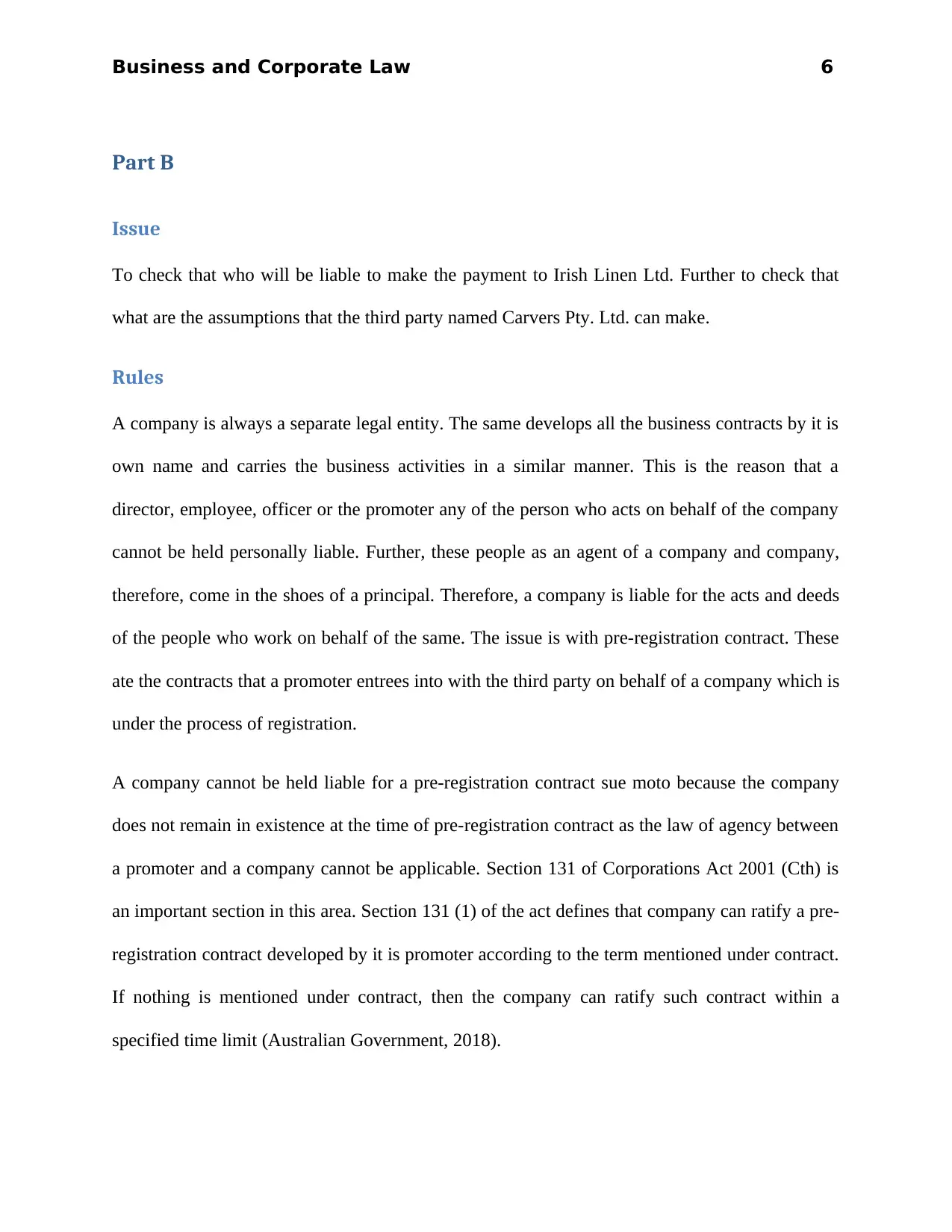
Business and Corporate Law 6
Part B
Issue
To check that who will be liable to make the payment to Irish Linen Ltd. Further to check that
what are the assumptions that the third party named Carvers Pty. Ltd. can make.
Rules
A company is always a separate legal entity. The same develops all the business contracts by it is
own name and carries the business activities in a similar manner. This is the reason that a
director, employee, officer or the promoter any of the person who acts on behalf of the company
cannot be held personally liable. Further, these people as an agent of a company and company,
therefore, come in the shoes of a principal. Therefore, a company is liable for the acts and deeds
of the people who work on behalf of the same. The issue is with pre-registration contract. These
ate the contracts that a promoter entrees into with the third party on behalf of a company which is
under the process of registration.
A company cannot be held liable for a pre-registration contract sue moto because the company
does not remain in existence at the time of pre-registration contract as the law of agency between
a promoter and a company cannot be applicable. Section 131 of Corporations Act 2001 (Cth) is
an important section in this area. Section 131 (1) of the act defines that company can ratify a pre-
registration contract developed by it is promoter according to the term mentioned under contract.
If nothing is mentioned under contract, then the company can ratify such contract within a
specified time limit (Australian Government, 2018).
Part B
Issue
To check that who will be liable to make the payment to Irish Linen Ltd. Further to check that
what are the assumptions that the third party named Carvers Pty. Ltd. can make.
Rules
A company is always a separate legal entity. The same develops all the business contracts by it is
own name and carries the business activities in a similar manner. This is the reason that a
director, employee, officer or the promoter any of the person who acts on behalf of the company
cannot be held personally liable. Further, these people as an agent of a company and company,
therefore, come in the shoes of a principal. Therefore, a company is liable for the acts and deeds
of the people who work on behalf of the same. The issue is with pre-registration contract. These
ate the contracts that a promoter entrees into with the third party on behalf of a company which is
under the process of registration.
A company cannot be held liable for a pre-registration contract sue moto because the company
does not remain in existence at the time of pre-registration contract as the law of agency between
a promoter and a company cannot be applicable. Section 131 of Corporations Act 2001 (Cth) is
an important section in this area. Section 131 (1) of the act defines that company can ratify a pre-
registration contract developed by it is promoter according to the term mentioned under contract.
If nothing is mentioned under contract, then the company can ratify such contract within a
specified time limit (Australian Government, 2018).
Paraphrase This Document
Need a fresh take? Get an instant paraphrase of this document with our AI Paraphraser
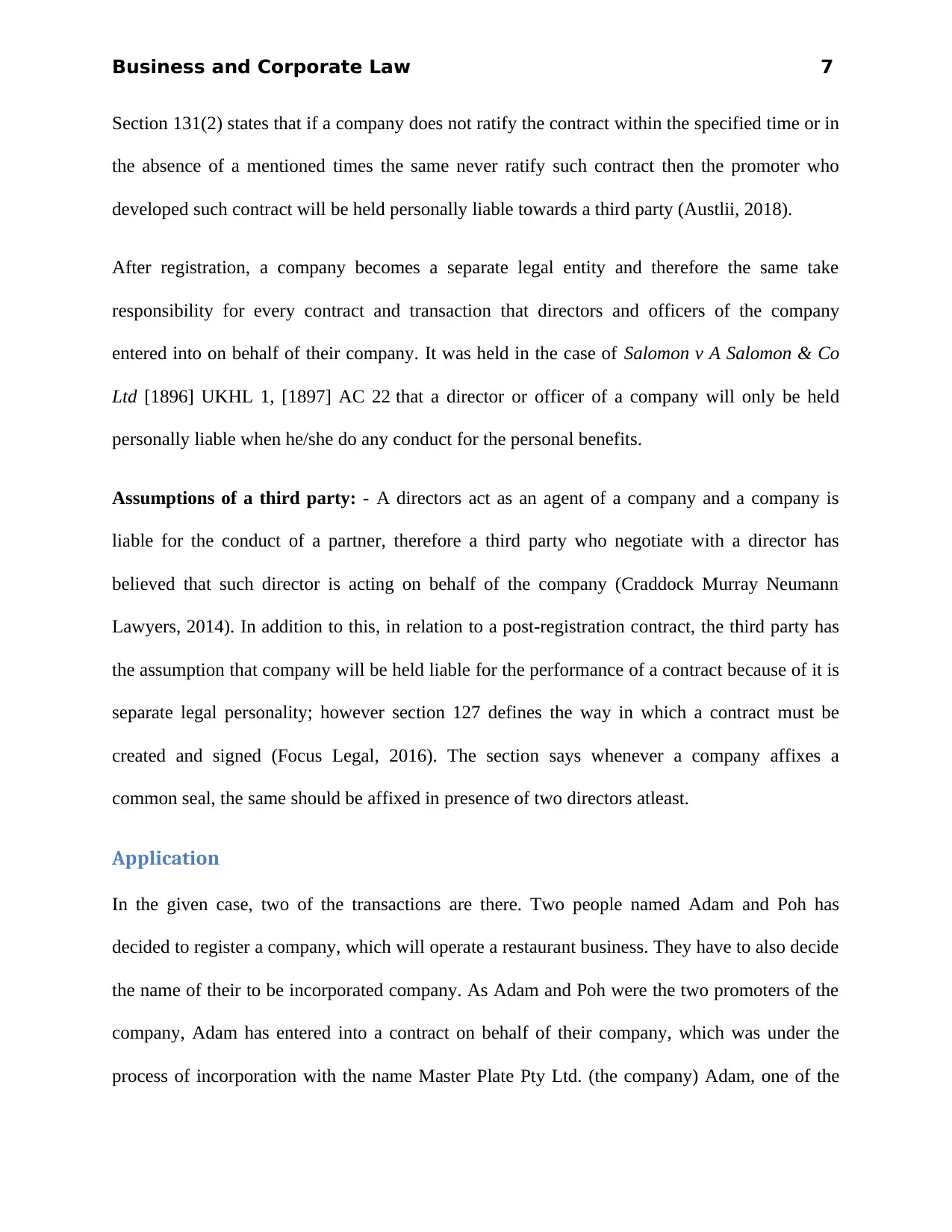
Business and Corporate Law 7
Section 131(2) states that if a company does not ratify the contract within the specified time or in
the absence of a mentioned times the same never ratify such contract then the promoter who
developed such contract will be held personally liable towards a third party (Austlii, 2018).
After registration, a company becomes a separate legal entity and therefore the same take
responsibility for every contract and transaction that directors and officers of the company
entered into on behalf of their company. It was held in the case of Salomon v A Salomon & Co
Ltd [1896] UKHL 1, [1897] AC 22 that a director or officer of a company will only be held
personally liable when he/she do any conduct for the personal benefits.
Assumptions of a third party: - A directors act as an agent of a company and a company is
liable for the conduct of a partner, therefore a third party who negotiate with a director has
believed that such director is acting on behalf of the company (Craddock Murray Neumann
Lawyers, 2014). In addition to this, in relation to a post-registration contract, the third party has
the assumption that company will be held liable for the performance of a contract because of it is
separate legal personality; however section 127 defines the way in which a contract must be
created and signed (Focus Legal, 2016). The section says whenever a company affixes a
common seal, the same should be affixed in presence of two directors atleast.
Application
In the given case, two of the transactions are there. Two people named Adam and Poh has
decided to register a company, which will operate a restaurant business. They have to also decide
the name of their to be incorporated company. As Adam and Poh were the two promoters of the
company, Adam has entered into a contract on behalf of their company, which was under the
process of incorporation with the name Master Plate Pty Ltd. (the company) Adam, one of the
Section 131(2) states that if a company does not ratify the contract within the specified time or in
the absence of a mentioned times the same never ratify such contract then the promoter who
developed such contract will be held personally liable towards a third party (Austlii, 2018).
After registration, a company becomes a separate legal entity and therefore the same take
responsibility for every contract and transaction that directors and officers of the company
entered into on behalf of their company. It was held in the case of Salomon v A Salomon & Co
Ltd [1896] UKHL 1, [1897] AC 22 that a director or officer of a company will only be held
personally liable when he/she do any conduct for the personal benefits.
Assumptions of a third party: - A directors act as an agent of a company and a company is
liable for the conduct of a partner, therefore a third party who negotiate with a director has
believed that such director is acting on behalf of the company (Craddock Murray Neumann
Lawyers, 2014). In addition to this, in relation to a post-registration contract, the third party has
the assumption that company will be held liable for the performance of a contract because of it is
separate legal personality; however section 127 defines the way in which a contract must be
created and signed (Focus Legal, 2016). The section says whenever a company affixes a
common seal, the same should be affixed in presence of two directors atleast.
Application
In the given case, two of the transactions are there. Two people named Adam and Poh has
decided to register a company, which will operate a restaurant business. They have to also decide
the name of their to be incorporated company. As Adam and Poh were the two promoters of the
company, Adam has entered into a contract on behalf of their company, which was under the
process of incorporation with the name Master Plate Pty Ltd. (the company) Adam, one of the
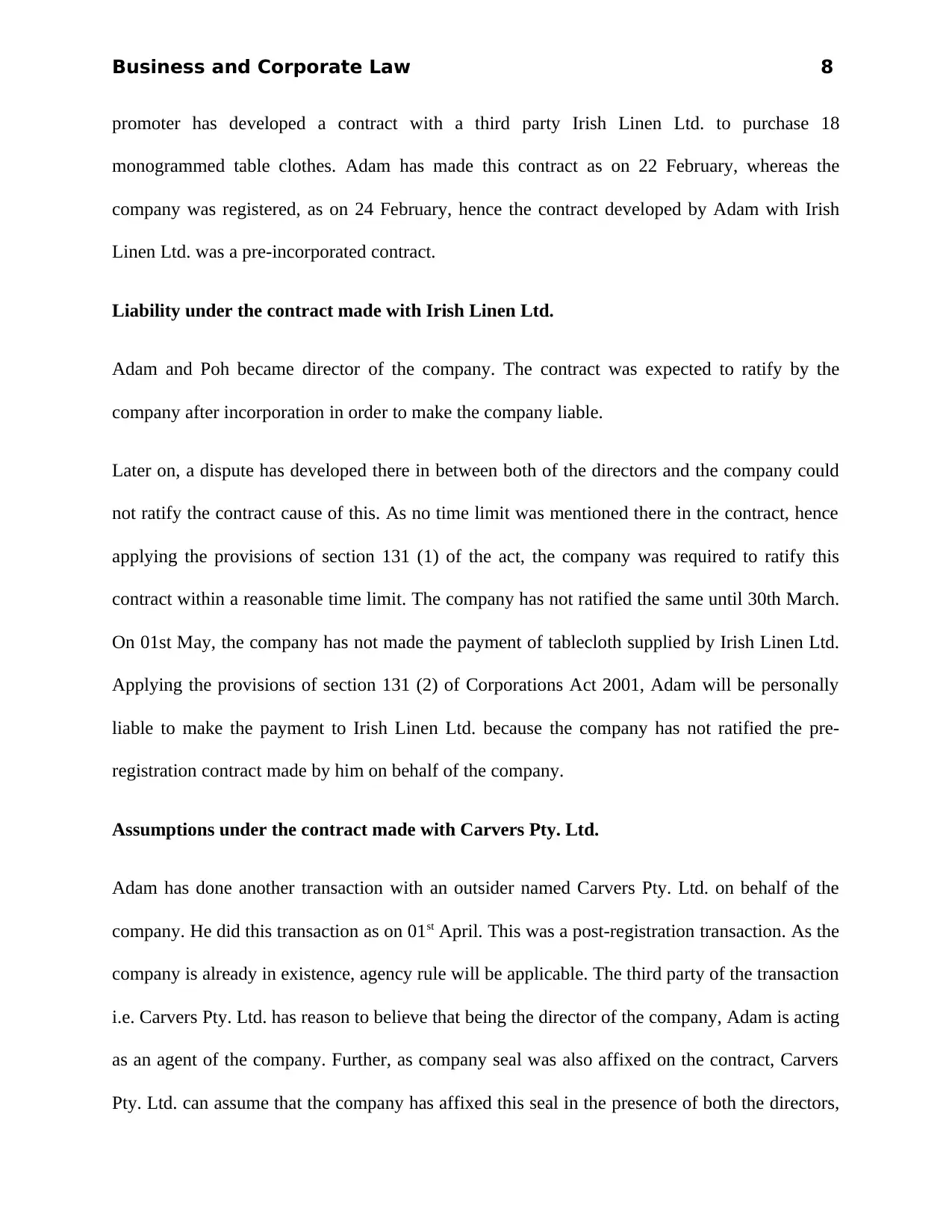
Business and Corporate Law 8
promoter has developed a contract with a third party Irish Linen Ltd. to purchase 18
monogrammed table clothes. Adam has made this contract as on 22 February, whereas the
company was registered, as on 24 February, hence the contract developed by Adam with Irish
Linen Ltd. was a pre-incorporated contract.
Liability under the contract made with Irish Linen Ltd.
Adam and Poh became director of the company. The contract was expected to ratify by the
company after incorporation in order to make the company liable.
Later on, a dispute has developed there in between both of the directors and the company could
not ratify the contract cause of this. As no time limit was mentioned there in the contract, hence
applying the provisions of section 131 (1) of the act, the company was required to ratify this
contract within a reasonable time limit. The company has not ratified the same until 30th March.
On 01st May, the company has not made the payment of tablecloth supplied by Irish Linen Ltd.
Applying the provisions of section 131 (2) of Corporations Act 2001, Adam will be personally
liable to make the payment to Irish Linen Ltd. because the company has not ratified the pre-
registration contract made by him on behalf of the company.
Assumptions under the contract made with Carvers Pty. Ltd.
Adam has done another transaction with an outsider named Carvers Pty. Ltd. on behalf of the
company. He did this transaction as on 01st April. This was a post-registration transaction. As the
company is already in existence, agency rule will be applicable. The third party of the transaction
i.e. Carvers Pty. Ltd. has reason to believe that being the director of the company, Adam is acting
as an agent of the company. Further, as company seal was also affixed on the contract, Carvers
Pty. Ltd. can assume that the company has affixed this seal in the presence of both the directors,
promoter has developed a contract with a third party Irish Linen Ltd. to purchase 18
monogrammed table clothes. Adam has made this contract as on 22 February, whereas the
company was registered, as on 24 February, hence the contract developed by Adam with Irish
Linen Ltd. was a pre-incorporated contract.
Liability under the contract made with Irish Linen Ltd.
Adam and Poh became director of the company. The contract was expected to ratify by the
company after incorporation in order to make the company liable.
Later on, a dispute has developed there in between both of the directors and the company could
not ratify the contract cause of this. As no time limit was mentioned there in the contract, hence
applying the provisions of section 131 (1) of the act, the company was required to ratify this
contract within a reasonable time limit. The company has not ratified the same until 30th March.
On 01st May, the company has not made the payment of tablecloth supplied by Irish Linen Ltd.
Applying the provisions of section 131 (2) of Corporations Act 2001, Adam will be personally
liable to make the payment to Irish Linen Ltd. because the company has not ratified the pre-
registration contract made by him on behalf of the company.
Assumptions under the contract made with Carvers Pty. Ltd.
Adam has done another transaction with an outsider named Carvers Pty. Ltd. on behalf of the
company. He did this transaction as on 01st April. This was a post-registration transaction. As the
company is already in existence, agency rule will be applicable. The third party of the transaction
i.e. Carvers Pty. Ltd. has reason to believe that being the director of the company, Adam is acting
as an agent of the company. Further, as company seal was also affixed on the contract, Carvers
Pty. Ltd. can assume that the company has affixed this seal in the presence of both the directors,
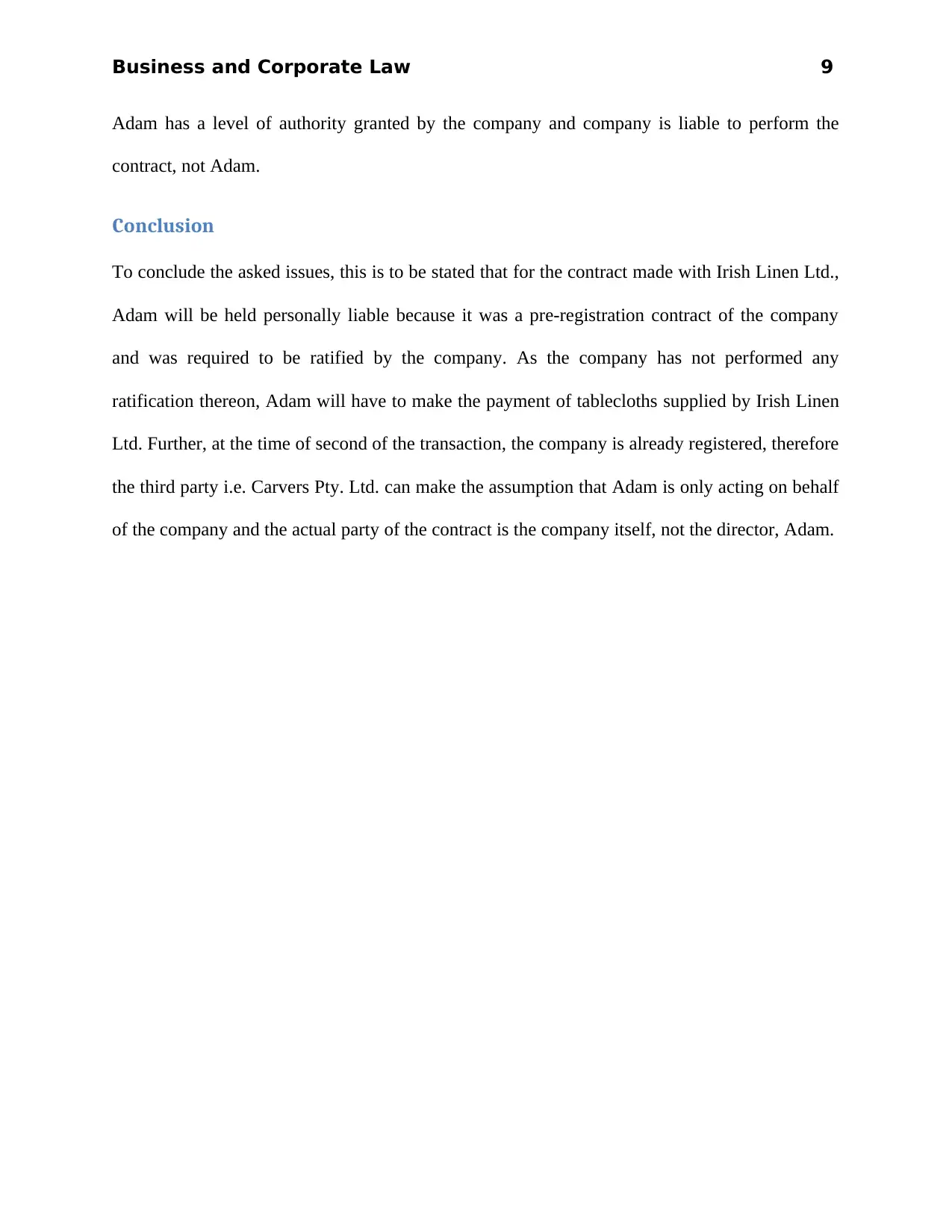
Business and Corporate Law 9
Adam has a level of authority granted by the company and company is liable to perform the
contract, not Adam.
Conclusion
To conclude the asked issues, this is to be stated that for the contract made with Irish Linen Ltd.,
Adam will be held personally liable because it was a pre-registration contract of the company
and was required to be ratified by the company. As the company has not performed any
ratification thereon, Adam will have to make the payment of tablecloths supplied by Irish Linen
Ltd. Further, at the time of second of the transaction, the company is already registered, therefore
the third party i.e. Carvers Pty. Ltd. can make the assumption that Adam is only acting on behalf
of the company and the actual party of the contract is the company itself, not the director, Adam.
Adam has a level of authority granted by the company and company is liable to perform the
contract, not Adam.
Conclusion
To conclude the asked issues, this is to be stated that for the contract made with Irish Linen Ltd.,
Adam will be held personally liable because it was a pre-registration contract of the company
and was required to be ratified by the company. As the company has not performed any
ratification thereon, Adam will have to make the payment of tablecloths supplied by Irish Linen
Ltd. Further, at the time of second of the transaction, the company is already registered, therefore
the third party i.e. Carvers Pty. Ltd. can make the assumption that Adam is only acting on behalf
of the company and the actual party of the contract is the company itself, not the director, Adam.
Secure Best Marks with AI Grader
Need help grading? Try our AI Grader for instant feedback on your assignments.
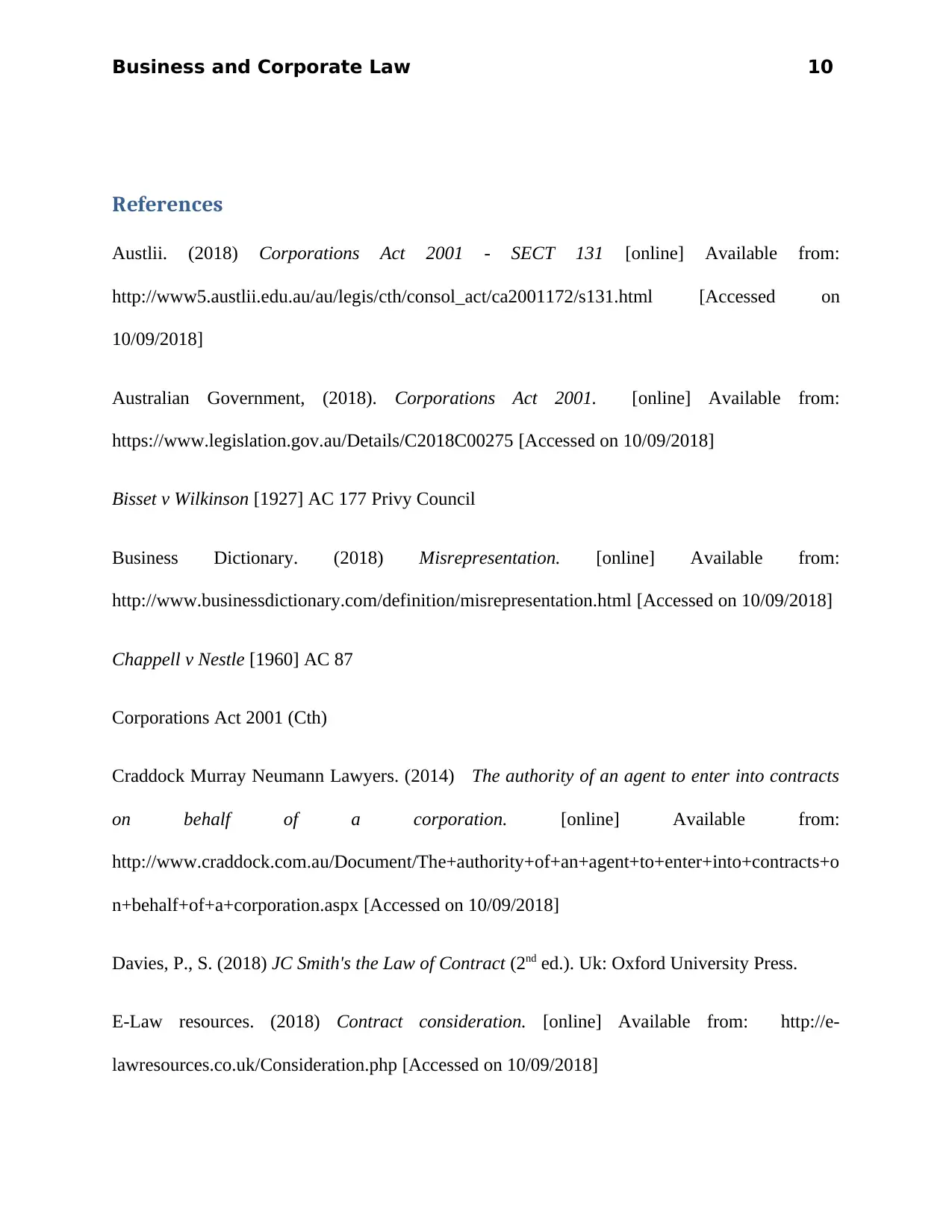
Business and Corporate Law 10
References
Austlii. (2018) Corporations Act 2001 - SECT 131 [online] Available from:
http://www5.austlii.edu.au/au/legis/cth/consol_act/ca2001172/s131.html [Accessed on
10/09/2018]
Australian Government, (2018). Corporations Act 2001. [online] Available from:
https://www.legislation.gov.au/Details/C2018C00275 [Accessed on 10/09/2018]
Bisset v Wilkinson [1927] AC 177 Privy Council
Business Dictionary. (2018) Misrepresentation. [online] Available from:
http://www.businessdictionary.com/definition/misrepresentation.html [Accessed on 10/09/2018]
Chappell v Nestle [1960] AC 87
Corporations Act 2001 (Cth)
Craddock Murray Neumann Lawyers. (2014) The authority of an agent to enter into contracts
on behalf of a corporation. [online] Available from:
http://www.craddock.com.au/Document/The+authority+of+an+agent+to+enter+into+contracts+o
n+behalf+of+a+corporation.aspx [Accessed on 10/09/2018]
Davies, P., S. (2018) JC Smith's the Law of Contract (2nd ed.). Uk: Oxford University Press.
E-Law resources. (2018) Contract consideration. [online] Available from: http://e-
lawresources.co.uk/Consideration.php [Accessed on 10/09/2018]
References
Austlii. (2018) Corporations Act 2001 - SECT 131 [online] Available from:
http://www5.austlii.edu.au/au/legis/cth/consol_act/ca2001172/s131.html [Accessed on
10/09/2018]
Australian Government, (2018). Corporations Act 2001. [online] Available from:
https://www.legislation.gov.au/Details/C2018C00275 [Accessed on 10/09/2018]
Bisset v Wilkinson [1927] AC 177 Privy Council
Business Dictionary. (2018) Misrepresentation. [online] Available from:
http://www.businessdictionary.com/definition/misrepresentation.html [Accessed on 10/09/2018]
Chappell v Nestle [1960] AC 87
Corporations Act 2001 (Cth)
Craddock Murray Neumann Lawyers. (2014) The authority of an agent to enter into contracts
on behalf of a corporation. [online] Available from:
http://www.craddock.com.au/Document/The+authority+of+an+agent+to+enter+into+contracts+o
n+behalf+of+a+corporation.aspx [Accessed on 10/09/2018]
Davies, P., S. (2018) JC Smith's the Law of Contract (2nd ed.). Uk: Oxford University Press.
E-Law resources. (2018) Contract consideration. [online] Available from: http://e-
lawresources.co.uk/Consideration.php [Accessed on 10/09/2018]
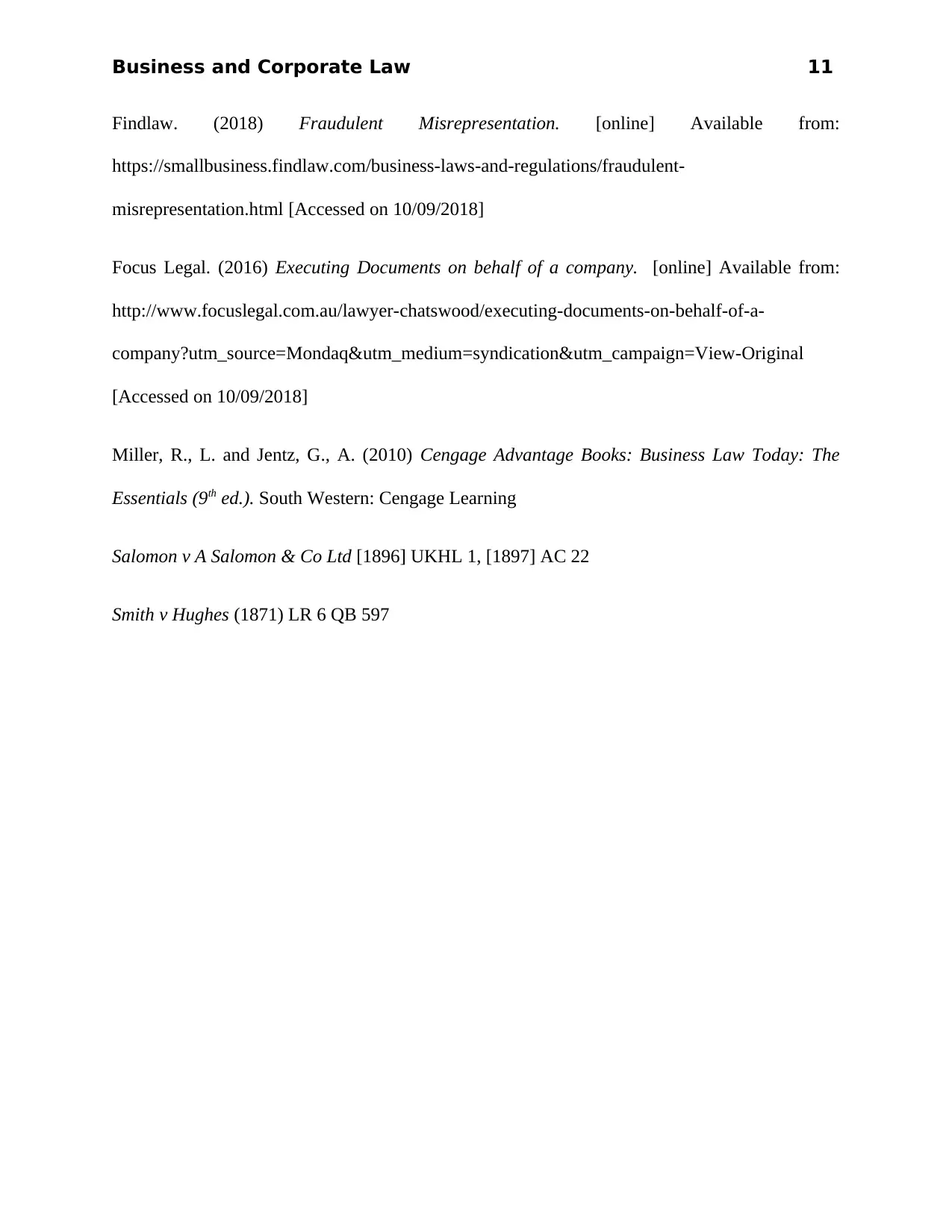
Business and Corporate Law 11
Findlaw. (2018) Fraudulent Misrepresentation. [online] Available from:
https://smallbusiness.findlaw.com/business-laws-and-regulations/fraudulent-
misrepresentation.html [Accessed on 10/09/2018]
Focus Legal. (2016) Executing Documents on behalf of a company. [online] Available from:
http://www.focuslegal.com.au/lawyer-chatswood/executing-documents-on-behalf-of-a-
company?utm_source=Mondaq&utm_medium=syndication&utm_campaign=View-Original
[Accessed on 10/09/2018]
Miller, R., L. and Jentz, G., A. (2010) Cengage Advantage Books: Business Law Today: The
Essentials (9th ed.). South Western: Cengage Learning
Salomon v A Salomon & Co Ltd [1896] UKHL 1, [1897] AC 22
Smith v Hughes (1871) LR 6 QB 597
Findlaw. (2018) Fraudulent Misrepresentation. [online] Available from:
https://smallbusiness.findlaw.com/business-laws-and-regulations/fraudulent-
misrepresentation.html [Accessed on 10/09/2018]
Focus Legal. (2016) Executing Documents on behalf of a company. [online] Available from:
http://www.focuslegal.com.au/lawyer-chatswood/executing-documents-on-behalf-of-a-
company?utm_source=Mondaq&utm_medium=syndication&utm_campaign=View-Original
[Accessed on 10/09/2018]
Miller, R., L. and Jentz, G., A. (2010) Cengage Advantage Books: Business Law Today: The
Essentials (9th ed.). South Western: Cengage Learning
Salomon v A Salomon & Co Ltd [1896] UKHL 1, [1897] AC 22
Smith v Hughes (1871) LR 6 QB 597
1 out of 12
Related Documents
Your All-in-One AI-Powered Toolkit for Academic Success.
+13062052269
info@desklib.com
Available 24*7 on WhatsApp / Email
![[object Object]](/_next/static/media/star-bottom.7253800d.svg)
Unlock your academic potential
© 2024 | Zucol Services PVT LTD | All rights reserved.





